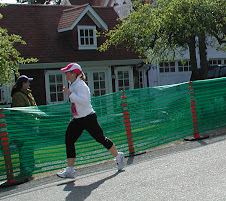This is not one of those blog posts where I pretend to know something about a topic and I pretentiously share tips and advice with you, complete with links to other resources.
No, this is where I admit that I am sorely lacking in knowledge and practice of running-related nutrition. Now, I don't mean that I know nothing about general nutrition, be it for runners or the population in general. My diet in general would make most nutritionists kneel at my feet in admiration (I say in all modesty).
But, except for an occasional foray into carb-loading before a race (which is more for my own enjoyment than any practical benefit), I have never eaten specifically to try to enhance my running performance. I have never fueled during a race, and only occasionally on a long run. I have never, ever used gels, sports drinks, or other nutrition enhancements, except for the occasional package of Sports Beans (and I have never actually eaten them during a race). I usually don't eat before a run (except for a few chocolate-covered coffee beans to get going), although on weekends when I have more time on my hands I may eat a light breakfast then wait an hour or so before I go out.
With a half marathon only a few days away, I have no intention of running out and buying packages of Gu or anything like that. I'll probably carry a packet of Sports Beans (which I won't eat because I don't want to stop to mess with the package), and maybe a couple of packets of honey, which I think I can rip open with my teeth and suck down adequately. If I can be bothered.
I'll tell you one reason I've never bothered to experiment with fueling on the run. It's the calorie consumption. I always want to "save" the calories burned by running in order to eat (more) "real" food afterwards. It's a fairly legitimate concern, I think. Why would I be sucking down gels at 100 calories a pop, when I could eat a cinnamon roll after I'm done? I've recently conceded, though, that on a long run or race (more than ten miles), I could probably spare a couple hundred calories along the way to refuel. How I accomplish that, I'm still not quite sure.
I do, after all, have a couple of links to some interesting other sources. I enjoyed this article, by a guy who thinks sort of like I do, and goes out for his runs without extra fuel and drinks only water. He does, however, consume fuel (carbs) during the actual race. He says that low blood sugar leads to hitting the wall, and by eating some during the run you can avoid that situation.
And it seems like everyone still stresses the importance of high quality carbs in the runner's diet, as well as protein. I have always been somewhat leery of carbs, but in the last few months of training have been a little more welcoming to whole grains and some other carbs, like my beloved sweet potatoes, in addition to the vegetables and fruits which I always eat in bulk (particularly vegetables).
So, for the next few days I don't plan any major changes in diet or fueling habits. I'll keep eating well, be a little more welcoming of carbs, and try not to diet excessively even though my calorie burn will a little bit reduced due to tapering. Maybe after this race is done I will start investigating and trying out various gels and look into whether any sports drinks make sense for me. Because of the hot weather and all the sweating I've been doing, I've been a lot more lenient about sodium, even putting salt on my food on occasion. And I do plan to work on hydrating well all week long, so I won't start out dehydrated when race day arrives on Saturday!
This morning - easy run, 6.3 miles, 1 hour 45 seconds, 9:38 average pace.
Splits 10:30, .54 mile at 9:31 pace, 9:51, 9:42, 9:27, 8:54, .76 mile at 9:27 pace.
Subscribe to:
Post Comments (Atom)




1 comment:
Ok, Kristen...Coach Lisa is here to tell you that you need to fuel your body! 100 calories is not going to make a difference in your overall diet, but it can really help your performance on a run.
With as much running as you've been doing (close to 40 miles a week, right?), carbs are your friends! Your body needs them for energy. Low carb diets may work for many people, but they don't really work for athletes. Continue to add those veggies and whole grains into your diet. When you think about eating to fuel your exercise, it takes on a whole new meaning.
Obviously, don't make any changes this week. But I do think you are smart to look into fueling for future runs. I plan on eating two gu's during my half marathon. They really seem to make a difference for me.
I'll be interested in seeing what you decide to do. Obviously, what you have been doing is working. I just wonder how much better your performance can be with the right fueling. It should be a fun experiment.
Post a Comment